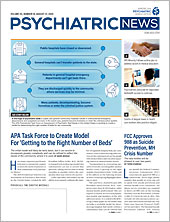Since May 25, when George Floyd, a 46-year-old Black American man, was killed in Minneapolis by police during an arrest for allegedly using a counterfeit bill, the nation has reacted to police brutality by beginning a conversation to understand and to change pervasive systemic racism in our society.
For example, on June 1, the Association of American Medical Colleges (AAMC) issued the AAMC Statement on Police Brutality and Racism in America and Their Impact on Health, co-signed by APA. It stated: “We must acknowledge and speak out against all forms of racism, discrimination, and bias in our environments in our institutions, communities, and society.”
In the month following the death of George Floyd, several commentators have focused specifically on the intertwined relationship between racism and climate change. Here are some thought-provoking examples:
•
In an interview in Yale360, published by the Yale School of Environment, Elizabeth Yeampierre, co-chair of the Climate Justice Alliance, astutely pointed out: “The communities that are most impacted by COVID, or by pollution, it’s not surprising that they are the ones that are going to be most impacted by extreme weather events. And it’s not surprising that they are the ones that are targeted for racial violence. It’s all the same communities, all over the United States. And you can’t treat one part of the problem without the other, because it’s so systemic.” (The Climate Justice Alliance is a coalition of more than 70 organizations focused on addressing racial and ethnic economic inequities together with climate change.)
•
In an editorial titled “Climate Justice Is Racial Justice, Racial Justice Is Climate Justice” published in the online magazine Shondaland, the Rev. Lennox Yearwood Jr. of Hip Hop Caucus declared: “My activism for racial justice and my activities for climate justice are one and the same. The climate crisis and environmental injustice play out within the same systems of white supremacy and structural racism that are at the root of police brutality. Communities [that] are most impacted by police brutality are the same communities that are most vulnerable to climate change. People of color have been dying and suffering because of environmental racism and the pollution from dirty fossil fuel infrastructure in our communities at the same time we have been dying at the hands of racist policing. Racism is the common denominator. …
“We cannot achieve climate justice without racial justice, and we cannot achieve racial justice without climate justice. The right to breathe clean air, drink clean water, access healthy and safe food, and live in a safe environment is the civil and human rights struggle of this century.”
•
In an article titled “The Links Between Racism and Climate Change,” Sue Ellen Campbell, writing in the June 24 issue of Yale Climate Connections (also published by the Yale School of the Environment), brings together an intriguing collection of recent articles, interviews, podcasts, photographs, blog posts, and a reading list on these two major crises of the moment.
Taken together, these recent materials underscore the synergistic effect of systemic racism seen not only in police brutality, but also involving other social determinants of health and mental health: climate change, food insecurity, income instability, poor lived environments, and poor health insurance coverage, among other factors. This synergistic effect is reflected in the illustration from Social Determinants of Mental Health edited by Compton and Shim (see chart). One only needs to look at the increasing daily COVID-19 infection and death rates in America, which are disproportionately high among people of color, to see the final common pathway result of systemic racism.
APA has the responsibility to effectively address the linkages between climate change and systemic racism and is doing so. For example, the Caucus on Climate Change and Mental Health, the Council on Minority Mental Health and Health Disparities, and other components dedicated to this issue are working together and need to work even more closely together to effect change. Together and united, we can join forces to accomplish great deeds. ■
AAMC Statement on Police Brutality and Racism in America and Their Impact on Health is posted
here.
The Yale360 interview with Elizabeth Yeampierre is posted
here.
“Climate Justice Is Racial Justice, Racial Justice Is Climate Justice” is posted
here.
“The Links Between Racism and Climate Change” is posted
here.


